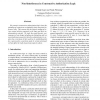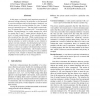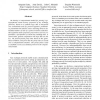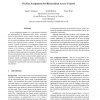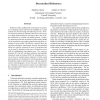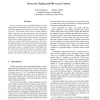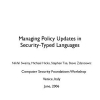92
Voted
CSFW
2006
IEEE
15 years 6 months ago
2006
IEEE
We present a constructive authorization logic where the meanings of connectives are defined by their associated inference rules. This ensures that the logical reading of access c...
113
click to vote
CSFW
2006
IEEE
15 years 6 months ago
2006
IEEE
In this paper we formally study important properties of electronic voting protocols. In particular we are interested in coercion-resistance and receipt-freeness. Intuitively, an e...
106
click to vote
CSFW
2006
IEEE
15 years 6 months ago
2006
IEEE
We develop a compositional method for proving cryptographically sound security properties of key exchange protocols, based on a symbolic logic that is interpreted over conventiona...
79
Voted
CSFW
2006
IEEE
15 years 6 months ago
2006
IEEE
A key assignment scheme is a cryptographic technique for implementing an information flow policy, sometimes known as hierarchical access control. All the research to date on key ...
93
Voted
CSFW
2006
IEEE
15 years 6 months ago
2006
IEEE
Robustness links confidentiality and integrity properties of a computing system and has been identified as a useful property for characterizing and enforcing security. Previous ...
CSFW
2006
IEEE
15 years 6 months ago
2006
IEEE
Secrecy properties can be guaranteed through a combination of static and dynamic checks. The static checks may include the application of special type systems with notions of secr...
118
Voted
CSFW
2006
IEEE
15 years 6 months ago
2006
IEEE
We argue that games are expressive enough to encompass (history-based) access control, (resource) usage control (e.g., dynamic adaptive access control of reputation systems), acco...
88
Voted
CSFW
2006
IEEE
15 years 6 months ago
2006
IEEE
Abstract. A multi-party contract signing protocol allows a set of participants to exchange messages with each other with a view to arriving in a state in which each of them has a p...
84
Voted
CSFW
2006
IEEE
15 years 6 months ago
2006
IEEE
A coalition provides a virtual space across a network that allows its members to interact in a transparent manner. Coalitions may be formed for a variety of purposes. These range ...
70
Voted
CSFW
2006
IEEE
15 years 6 months ago
2006
IEEE
